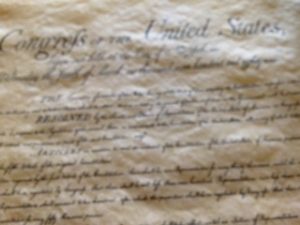 On top of their disappointing reading and math performances on the 2022 NAEP–the National Assessment of Educational Progress, aka the nation’s report card–now comes students’ poor showing on the history component.
On top of their disappointing reading and math performances on the 2022 NAEP–the National Assessment of Educational Progress, aka the nation’s report card–now comes students’ poor showing on the history component.
About that, says Peggy Carr, commissioner of the National Center for Education Statistics (NCES): “Whether students know United States history and civics is a national concern. A well-rounded education includes a grounding in these democratic principles.”
And yet here we are…
- About 33% of students can’t describe the structure or function of the government. On a scale of 0 to 500:
-
- In history, scores dropped to 258/500, with…
** 13% of 8th graders scoring at or above the proficient level,
** 46% scoring at the basic level, and
** 40% scoring at the below basic level. - In civics, scores came in at just 150/500, with…
** 22% of 8th graders scoring at or above the proficient level,
** 48% scoring at the basic level, and
** 31% scoring at the below basic level.
- In history, scores dropped to 258/500, with…
These results are not just about the downward trend in reading.
As Ms. Carr reminds us, “Students have to be able to read and know literacy skills, but they also need critical thinking to know how to extrapolate an answer to a question… It’s not just about reading, it’s about context, facts, dates, information about our constitutional system. Students don’t know this information. That is why they are scoring so low.”
Adds the National Constitution Center’s Kerry Seutner: “Our students are losing interest in history taught in our schools and are beginning to disengage from—and become more fearful of expressing their opinions on history, government, and other topics important to civic learning.”
Speaking for many, AP U.S. Government and History teacher Patrick Kelly says, “I hope this latest Nation’s Report Card serves as a wake-up call.”
But…
Of note: At Mr. Kelly’s Blythewood High School in South Carolina, students must answer ten questions from the U.S. Citizenship exam to graduate; however, the district gets to choose those 10 questions—and usually the easiest among them. Plus, the kids don’t have to get the answers right; they just have to take the test.
Meanwhile:
- Only about 68% of the 8th graders reported taking classes in U.S. history, down from 72% in 2018.
- Only about 50% of 8th graders reported taking classes primarily focused on civics or government, about the same as in 2018.
And, according to the CivXNow Coalition:
- Last year, just 38 states required a stand-alone civics course in order to graduate from high school.
- Last year, just 7 states required civics in middle school.
Why, I ask myself, doesn’t any of this make front page news?
With my thanks, Carol
www.schoolwisebooks.com